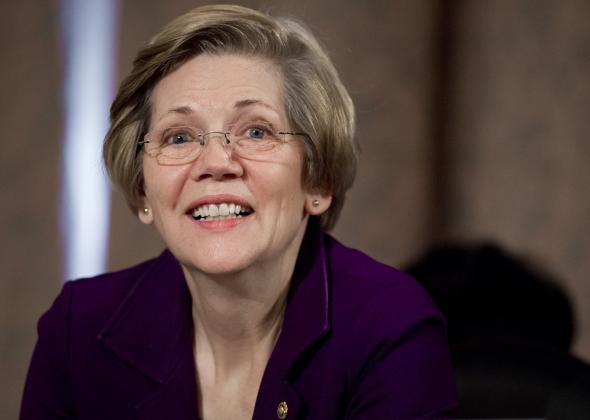Partisans Haven’t Figured Out How to Hate Elizabeth Warren Yet

Photo by Saul Loeb/AFP/Getty Images
Yesterday was fairly busy and historic at Slate, so I didn't get to join the caravan of reporters covering Elizabeth Warren's drop-in to West Virginia. The senator from Massachusetts was stumping for Natalie Tennant, the well-regarded secretary of state who's been given the thankless task of holding a seat in a state that voted against the Obama-Biden 2012 ticket in every single county. (No previous Democratic campaign had done so poorly.) "Dozens" of reporters were there to watch Warren, according to Robert Costa, some making their first jaunt to cover a race that has never been competitive this year.
Warren gave the speech she usually gives—us (nice people who work hard) vs. them (Wall Street). "Citibank and Goldman Sachs and all those other guys on Wall Street, they’ve got plenty of folks in the U.S. Senate willing to work on their side," she said in West Virginia. She said something similar in Kentucky.
And in Kentucky, the smart take was that Mitch McConnell could benefit because "the visit by Warren— onsidered one of the most liberal lawmakers in the Senate—represents an opportunity to align Grimes once again with unpopular Democratic figures." In West Virginia, Costa put it like this:
Tennant’s decision to invite Warren signals where she stands on the tension within the Democratic Party over whether to move more to the left as it tries to hold on to a slim Senate majority — and that she needs progressives to turn out in droves. Warren, who has frequently railed against the coziness of both parties with corporate titans and hedge-fund managers, is not beloved by some centrist Democratic financiers.
Some financiers? Sure, probably. Worth mentioning here that Warren raised close to $45 million for her 2012 Senate race, having never run for office before. There are make-work Democratic organizations that criticize "populism" in the party, and criticize a focus on "inequality" taking the place of a focus on "opportunity," and there are banking groups that went to battle with Warren during the creation of the Consumer Financial Protection Bureau.
But centrist Democrats? Most liberal senator? I see a lot of attempts to put Warren in a box that she doesn't even need to get near unless she runs for president. Ripping shreds out of "the banks" is not just populist, but popular. If it weren't, you'd be able to name a candidate who proudly declared that he stood with Citigroup or Goldman Sachs. If it weren't, you'd see the charter of the Export-Import Bank being extended, because libertarians would have no constituency for a campaign to stop sales guarantees for large companies. If it weren't, the CFPB itself would poll terribly. It doesn't—as Warren knew in 2010, it was a popular idea opposed by bank lobbyists out of fear that it would become a popular reality. And if it wasn't, the aforementioned lobbyists would be weakening Dodd-Frank in Congress instead of through the regulatory system and rule approval process.
There's more evidence that the GOP has struggled to define Warren than evidence that she's unpopular. The local GOP put no real energy into "bracketing" Warren, opting to troll Tennant for breathing the same air as someone who favored (dramatic music) the new EPA regulations. Warren's in the position that Barack Obama was when, in the 2006 cycle, he raised money for West Virginia Sen. Robert Byrd.
So what does it mean, in 2014, that Warren can hit West Virginia and Obama can't? Well, Obama has been president for five-odd years and become incredibly unpopular in a state that never liked him once he started running for president. (Obama lost the 2008 West Virginia primary by a landslide, with voters who called race "a factor" in their vote breaking huge for Hillary Clinton.) Warren isn't as culturally alien to West Virginia as Obama is, but she's also not the same sort of partisan figure. She would be if she ran for president. For now, she simply reminds the people at campaign rallies that running against the fathers of the financial crisis is a good idea.
